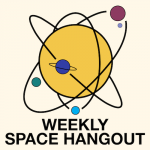Podcaster: Host : Fraser Cain ; Guest: Dr. Jake Abbott, Dr. Nick Castle, C.C. Petersen, Pam Hoffman

Title: Weekly Space Hangout – How We Can Clean Up Earth’s Space Debris with Dr. Jake Abbott
Link: Cosmoquest: http://cosmoquest.org
Description:
Today’s story:
- JWST & what it’s going to be looking at.
- A comet, 2 meteor showers, 2 contests & a citizen science project!
- Crazy Pluto geology.
- New information on the clouds of Venus.
- Hyabusa samples.
Host: Fraser Cain ( @fcain )
Special Guest: This week we are excited to welcome Dr. Jake Abbott, director of the Telerobotics Laboratory at the University of Utah to the WSH. The proliferation of Space Debris has become an increasingly alarming reality. In fact, as recently as December 3, 2021, “The International Space Station (ISS) had to swerve away from a fragment of a U.S. launch vehicle” (source: https://www.reuters.com/lifestyle/science/international-space-station-swerves-dodge-space-junk-2021-12-03/). In a paper published in November 2021 in the science journal Nature , Jake and his research team have proposed a new method of dealing with the debris: using a series of spinning magnets to move these objects. You can read more about their proposed solution here https://attheu.utah.edu/facultystaff/waste-of-space/.
Jake Abbott is a Professor in the Department of Mechanical Engineering and an Adjunct Professor in the School of Computing at the University of Utah, and he is the director of the Telerobotics Laboratory. He joined the University of Utah in 2008. Before coming to Utah, he spent three years in Switzerland as a postdoctoral researcher working with Brad Nelson at the Institute of Robotics and Intelligent Systems at ETH Zurich. Dr. Abbott received his Ph.D. from the Johns Hopkins University in 2005 working with Allison Okamura, his M.S. from the University of Utah in 2001, and his B.S. from Utah State University in 1999, all in Mechanical Engineering.
Jake Abbott’s research has been funded by the NSF (including the CAREER Award), the NIH, NASA, the Air Force, and industry. He and his co-authors have won a number of Best Paper and Best Poster Awards at international conferences. He is currently an Associate Editor for the International Journal of Robotics Research, and was previously an Associate Editor for IEEE Transactions on Robotics.
In Jake’s spare time, he’s a movie buff, a foodie, and an all-around supporter of the arts and the community in Salt Lake City. Jake’s wife is a flamenco dancer and instructor in Salt Lake City, and he plays guitar and sings as part of her group.
You can learn more about Jake and his research by visiting https://www.telerobotics.utah.edu/index.php/People/JakeAbbott and https://www.mech.utah.edu/directory/faculty/jake-abbott/
Regular Guests:
- Dr. Nick Castle ( @PlanetaryGeoDoc )
- C.C. Petersen ( http://thespacewriter.com/wp/ & @AstroUniverse & @SpaceWriter )
- Pam Hoffman ( http://spacer.pamhoffman.com/ & http://everydayspacer.com/ & @EverydaySpacer )
Today’s sponsor: Big thanks to our Patreon supporters this month: Rob Leeson, David Bowes, Brett Duane, Benett Bolek, Mary Ann, Frank Frankovic, Michael Freedman, Kim Hay, Steven Emert, Frank Tippin, Rani Bush, Jako Danar, Joseph J. Biernat, Nik Whitehead, Michael W, Cherry Wood, Steve Nerlich, Steven Kluth, James K Wood, Katrina Ince, Phyllis Foster, Don Swartwout, Barbara Geier, Steven Jansen
Please consider sponsoring a day or two. Just click on the “Donate” button on the lower left side of this webpage, or contact us at signup@365daysofastronomy.org.
Or please visit our Patreon page: https://www.patreon.com/365DaysOfAstronomy
End of podcast:
365 Days of Astronomy
=====================
The 365 Days of Astronomy Podcast is produced by Planetary Science Institute. Audio post-production by Richard Drumm. Bandwidth donated by libsyn.com and wizzard media. You may reproduce and distribute this audio for non-commercial purposes.
This show is made possible thanks to the generous donations of people like you! Please consider supporting to our show on Patreon.com/365DaysofAstronomy and get access to bonus content.
After 10 years, the 365 Days of Astronomy podcast is poised to enter its second decade of sharing important milestone in space exploration and astronomy discoveries. Join us and share your story. Until tomorrow! Goodbye!

